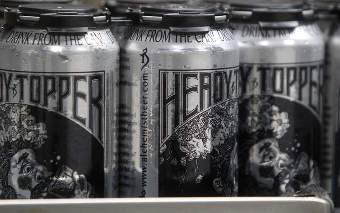
In this Sept. 4, 2013 photo, cans of Heady Topper roll off the line at the Alchemist Cannery in Waterbury, Vt. (AP Photo/Toby Talbot)
The frenzy over hard to get out-of-market and cult beers has caught the attention of law enforcement, who are cracking down on the illegal resale of beers online.
Authorities in Vermont this week charged a 28-year-old Burlington woman with selling alcohol without a license after she took to Craigslist to peddle cans of the highly-sought-after Heady Topper, a double IPA that is regularly competes for the top spot on the world’s best beers lists with Sonoma County’s Pliny the Elder from Russian River Brewing. The brewery, called The Alchemist, only produces only around 9,000 barrels of the brew per year, about the same volume as Pliny, but the company only distributes it in stores and bars within a few miles of its headquarters in Waterbury. The frenzy had grown so great for the beer that The Alchemist had to quit selling beer directly from the brewery after neighbors complained about the crowds forming to snap up cases of the stuff.
The black market beer suspect, Stephanie Hoffman, stepped into the void, state agents say, by cutting deals to sell the beer privately for about double it’s normal price – it retails for about $12 to 14 a four-pack.
Writes the Associated Press:
“It’s a compliment in an odd way,” said Jen Kimmich, owner of The Alchemist brewery in Waterbury, which produces Heady Topper. The hoppy concoction, which retails for $3 a can and $72 a case, was recently ranked No. 1 by Beer Advocate magazine out of the top 250 beers in the world.
“But at the same time,” she added, “we don’t want to see the consumer being cheated by paying too much and getting a product that hasn’t been taken care of properly.”
Russian River too has seen its share of pirate product on the black market. Co-owner Natalie Cilurzo was a leader in the effort to get E-Bay to quit selling Pliny and similar treasures from other breweries, usually as astronomical prices.
“It was out of control,” she told the Associated Press. “People were running liquor stores on eBay without any accountability.”
This is somewhat different from the more common phenomenon of beer trading, where beer geeks share prime product from their area in return for treasures from another. The practice is semi-legal at best (the post office, for example, is not supposed to accept alcohol, but that doesn’t stop many people from simply neglecting to mention the contents of a package), but for the most part regulators and brewers have tolerated the trade market. Once money begins to trade hands, however, both state and federal regulators start to get a whole lot more anxious and brewers are usually happy to cooperate in tipping authorities to illegal sales.
“There’s an awfully good chance that somebody selling interstate will be running afoul of state law,” Treasury Department spokesman Thomas Hogue told The Washington Post in a 2011 article on black market brew.
– Sean Scully

 buyer at Fircrest Market in Sebastopol and the administrator of the NorCal Beer Geeks group on Facebook.
buyer at Fircrest Market in Sebastopol and the administrator of the NorCal Beer Geeks group on Facebook.